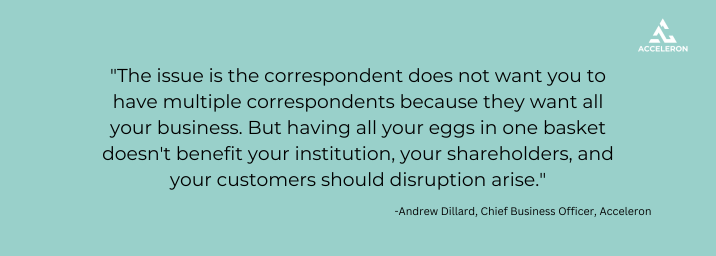Community banks need to protect themselves from de-risking by working with multiple correspondent banking partners
Key Takeaways:
- Surging Cross-Border Payments: The global value of cross-border payments is expected to surge to over $250 trillion by 2027, highlighting the growing opportunity for community banks.
- Diversification is Crucial: Amid a de-risking trend, maintaining multiple correspondent banking relationships is essential.
- Technological Compatibility Matters: Evaluate correspondent banks for their ability to automate services via APIs to reduce operational strain and improve efficiency.
A wave of de-risking is sweeping through the correspondent banking industry, posing significant challenges for financial institutions worldwide. What is de-risking? It is the trend of correspondent banks terminating or restricting business relationships to avoid risk. De-risking threatens the stability and operational efficiency of smaller community banks that rely heavily on these relationships to offer comprehensive international services to their customers.
As a community bank, how can you protect yourself against the de-risking phenomenon? The answer lies in strategically maintaining multiple correspondent banking relationships. By increasing and diversifying your correspondent banking partners, you can safeguard your operations from the impact of de-risking, ensure continued service to your customers, and mitigate the risks associated with the sudden termination of any single relationship.
"It’s crucial to maintain multiple correspondent relationships and build redundancies. It’s the best way to guard against unforeseen events and ensure your business operations are not disrupted," says Andrew Dillard, Chief Business Officer at Acceleron, which builds software allowing community banks and credit unions to conduct international payment transactions profitably through a foreign exchange (FX) marketplace.

This guide provides community banks with practical insights and strategies for selecting and maintaining multiple correspondent banking relationships. It also provides tips on how to utilize new technology to earn untapped revenue on international wire transactions.
Subscribe to our monthly newsletter for the latest news on community and correspondent banking:
What is Correspondent Banking?
Correspondent banking involves a bank (the correspondent) providing services on behalf of another bank (the respondent), usually in a different country. Correspondent banks facilitate international fund transfers and settlement between originating and receiving banks. These services include international wires, business transactions, and currency exchange, enabling banks to conduct global operations without a physical presence abroad. Correspondent banking is the backbone of the international banking system, supporting trade finance, remittances, and humanitarian aid.
Importance of Correspondent Banking Services for Community Banks
For community banks, correspondent banking relationships are crucial. They allow smaller institutions to offer international services and extend their reach globally, enhancing their competitive edge and customer satisfaction. Additionally, these relationships enable community banks to earn non-interest income, diversify their revenue streams, and better serve their local communities by providing global markets services to customers.
For more on non-interest income read our article: Don’t Think Your Clients Are Sending International Payments? Think Again.
Rising Value of Cross-Border Payments
According to the Bank for International Settlements (BIS), cross-border payments are increasing — up by 2% in volume and 7% in value in 2020. The Bank of England estimates that the value of global cross-border payments will surge from almost $150 trillion in 2017 to over $250 trillion by 2027.

Correspondent banking plays a crucial role in the movement of these payments in the international financial system, facilitating $746 billion worth of daily transactions in the Eurozone alone in 2019.
Impact of De-risking
Despite those positive numbers, correspondent relationships are contracting at a concerning rate due to de-risking. In 2020, correspondent relationships declined by 4% from the year before, continuing a de-risking trend that saw a reduction of relationships of about 30% from 2011 to 2020.

The International Finance Corporation (IFC) attributes de-risking to a combination of low margins and heightened risks that financial institutions no longer find cost-effective to maintain. Stricter financial regulations and compliance requirements have further diminished risk appetite among correspondent banks.
“De-risking impacts a bank's ability to provide services to its customers. And it can impact a whole host of services not just on the payment side, but across the board and its ability to function,” Dillard says.
Reasons why banks will de-risk you include:
- Inadequate Size as a Client: Smaller clients may not generate enough revenue to justify the compliance costs for correspondent banks. As a result, these banks prioritize larger institutions that offer better profit margins.
- Discontinued Product or Service: Strategic changes, often driven by new leadership, can lead correspondent banks to discontinue certain products or services. This shift is usually a business decision rather than a reflection on your institution.
- Restricted Customer/Member: High-risk classifications of customers or members can prompt de-risking. This can occur if a customer is involved in money services, cryptocurrencies, the cannabis industry, or transactions with high-risk regions.
Dillard says this is why community banks need to work with multiple correspondents who can serve smaller clients and are experienced in working with bank customers with elevated risk profiles.
For more on de-risking, read our article “Oh Snap, We’ve Been De-risked!”
Why Multiple Correspondent Banking Relationships Can Mitigate De-risking
To mitigate de-risking, community banks can benefit from maintaining multiple correspondent banking relationships. Here are the key advantages:
- Risk Diversification: Spreading risk across multiple correspondents protects against the sudden termination of any single relationship, ensuring your operations remain stable and uninterrupted.
- Enhanced Stability: With multiple relationships, your bank can continue providing services even if one correspondent faces regulatory or financial issues.
- Better Pricing and Service: Comparing and negotiating terms with several correspondents can lead to improved services and more competitive pricing, enhancing your bank’s overall efficiency and profitability.
- Access to Different Markets: Different correspondents may excel in various regions or services, offering broader and more flexible options for your bank and its customers.
- More Flexibility and Expanded Customer Base: Some correspondents have a higher risk appetite and are more willing to work with community financial institutions that have varying customer risk profiles. This flexibility allows your bank to service a wider range of customer segments and choose the best correspondent for specific services based on price and efficiency.
Dillard highlights the importance of this approach: "The issue is the correspondent does not want you to have multiple correspondents because they want all your business. But having all your eggs in one basket doesn't benefit your institution, your shareholders, and your customers should disruption arise."

By maintaining multiple correspondent banking relationships, community banks can enhance their operational resilience, improve service quality, and support long-term growth and stability, ensuring they can navigate the challenges posed by de-risking.
Identifying Potential Correspondent Banks
When selecting correspondent banks, prioritize financial stability and reputation to ensure reliability and minimize service disruptions. Additionally, assess the range of services offered, such as international wire transfers, trade finance, and currency exchange, to meet your bank's specific needs and enhance customer satisfaction.
Another key consideration is fees. While top correspondent banks like JPMorgan Chase, Bank of America, and Citibank offer extensive services, they charge a premium and have low-risk appetites. For institutions involved in frontier banking sectors like cannabis or crypto, these banks may not be suitable partners.
For more on selecting correspondent banks, read our article: Top 7 Things to Consider When Choosing a Correspondent Bank
Technological Compatibility to Eliminate Manual Processing
Another often overlooked criterion is technological compatibility. Dillard emphasizes its importance: "It's crucial to evaluate a correspondent bank's ability to automate services through APIs — application programming interfaces which allow two or more computer programs to talk to each other. The banking industry is still catching up in terms of tech adoption, and correspondent banks are no exception."
A correspondent bank may offer a particular service you want but its systems may require manual processing, which can create significant operational strain. For instance, if your bank handles numerous international wires, choosing a correspondent bank without wire automation can overwhelm your wire and compliance departments. Therefore, it's essential to ask key questions about API connectivity and the potential for automating processes.
Questions to Correspondent Banks About API Connectivity
- Does the correspondent bank allow for API connectivity?
- Can wire processing be automated?
- Is manual entry required for transactions?
- Are they integrated with systems I already use?
- Is the relationship all-or-none, or can services be a la carte?
- Do they offer the specific product set I need?
- Are they a competitor?
- How do their prices and timing compare with others?
A La Carte Correspondent Banking Options
Dillard encourages banks to rethink correspondent banking services as a set of la carte options tailored to their specific needs. For instance, you might need a correspondent that excels in processing international wires, and another that provides letters of credit. Instead of settling for a correspondent that offers subpar services in one area, banks can seek out specialists for each need, and save money in the process.
For international wires, the role of technology can be particularly helpful. Innovative aggregator platforms like Acceleron provide banks with access to multiple correspondent banks through a single connected interface. The Acceleron platform allows community banks to leverage bulk volume pricing that Acceleron has negotiated with correspondents with varying risk appetites. This approach enables banks to select the best correspondents for each specific requirement and more flexibility.
Acceleron’s FX Marketplace Solution
Acceleron provides advanced API technology for international payments processing, specifically designed for community banks and credit unions. This solution enables these financial institutions to handle foreign exchange (FX) transactions profitably.
Aggregator of Correspondent Banks
Acceleron stands out by creating an FX marketplace where the correspondent banks bid on client foreign exchange rates, compressing pricing, and increasing revenue. This competitive environment allows community banks and credit unions to benefit from the best pricing available.
How the FX Marketplace Drives Revenue
- Competitive FX Rates: Offering attractive foreign exchange rates helps banks attract and retain more customers.
- Fee Generation: Community banks and credit unions can generate additional income through transaction fees and FX margins.
- Automation and Efficiency: Acceleron's advanced technology and API provide automation, reducing manual processes and increasing operational efficiency, which saves money.
Ease of Integration
For those already using top payment platforms, integration with Acceleron is simple. First, select the international payments tab and begin the onboarding process with Acceleron along with one or more correspondent banks, without additional integration costs. The Acceleron platform then becomes the default solution for your FX wires.
To send a wire, enter your FX wire transaction amount. It is then automatically routed to the marketplace, where multiple correspondents bid on the exchange rate. The best available rate is returned within seconds.
Reduced Manual Entry
From there, you send your wire directly to the receiving bank. Your operations department no longer needs to key in transactions separately to a correspondent bank. Data flows seamlessly from end to end, reducing the burden on staff by removing extra manual processes, file transfers, and statement reconciliations. Automated validations during the input process ensure all wire information is complete before processing, minimizing errors by catching issues upfront and preventing needless delays.
Customized solutions are available for those not integrated with Payments Exchange as well. For those interested in finding out more, the Acceleron staff can perform discovery to ascertain how best to service a bank’s wire needs.
Multiple Correspondent Banking Relationships for Future Success
Establishing and maintaining multiple correspondent banking relationships is essential for community banks aiming to navigate the complexities of de-risking to enhance financial stability, and improve pricing. By diversifying their correspondent banking partnerships, community banks can mitigate risks, ensure continuous access to global financial networks, and offer more robust services to their clients.
When selecting correspondent banks, it is best to approach their services as a la carte, selecting those tailored to your specific needs. Key factors such as the correspondent’s risk appetite and technological capabilities are crucial to consider. Utilizing a platform already integrated with multiple correspondent banks can save time and money while supporting long-term growth.
Acceleron builds patented software that allows community banks and credit unions to conduct international payment transactions profitably through a foreign exchange (FX) marketplace. Serving over 200 financial institutions and orchestrating more than $1 billion in international payments annually, Acceleron helps small banks generate non-interest income and compete more effectively with high-fee big banks. Our solutions integrate seamlessly with top payments platforms, ensuring quick implementation and smooth operation.
Contact us to book a meeting in person or online.
 Daisy Lin, Head of Marketing, Acceleron
Daisy Lin, Head of Marketing, Acceleron







